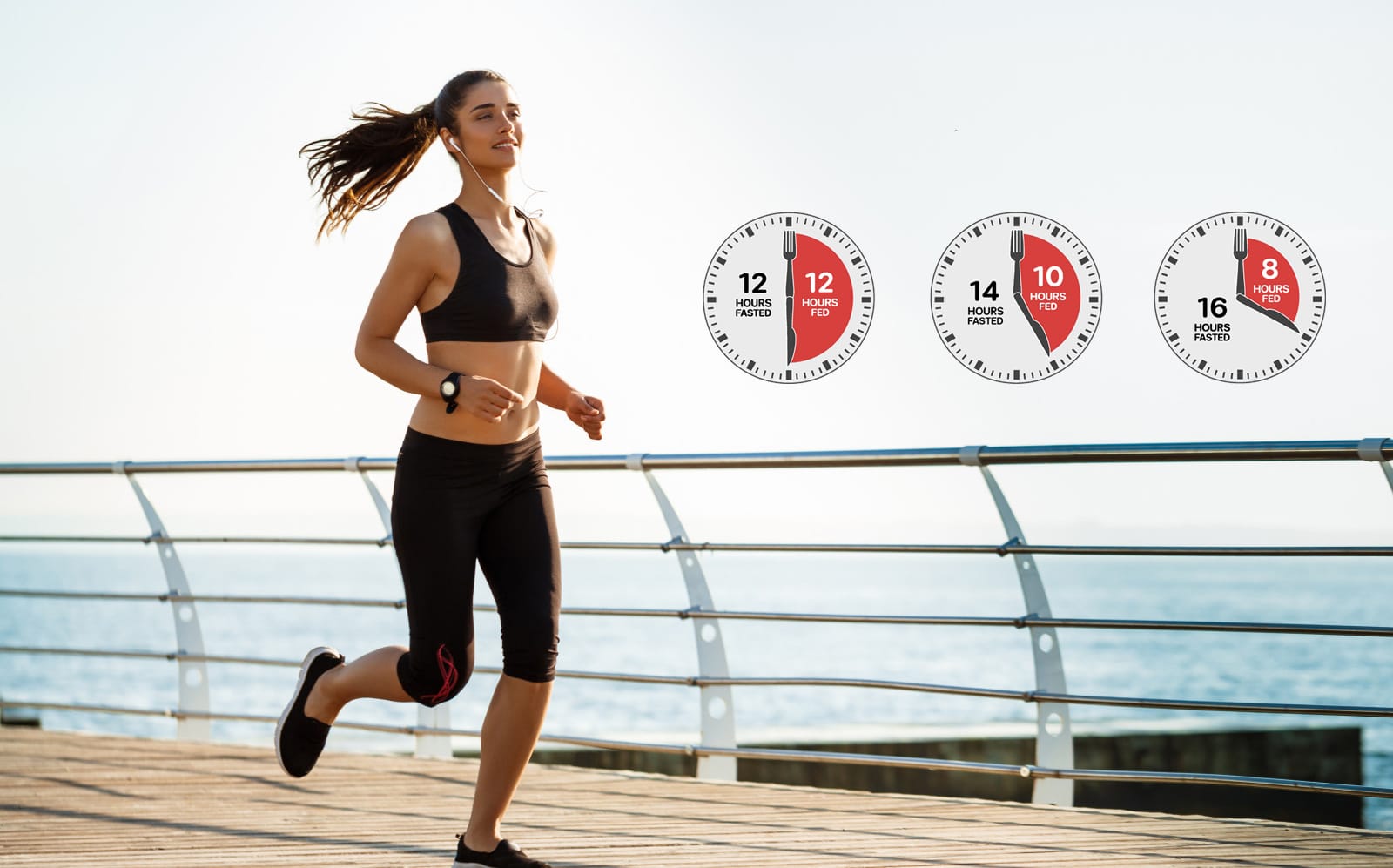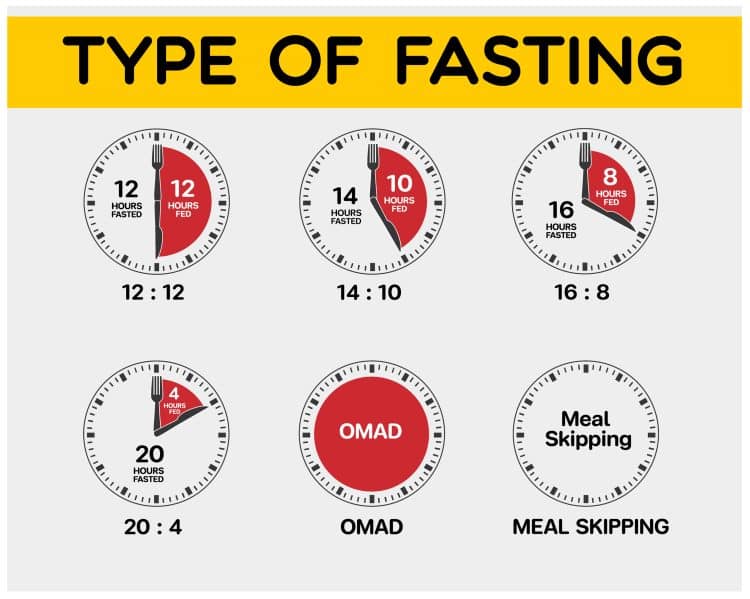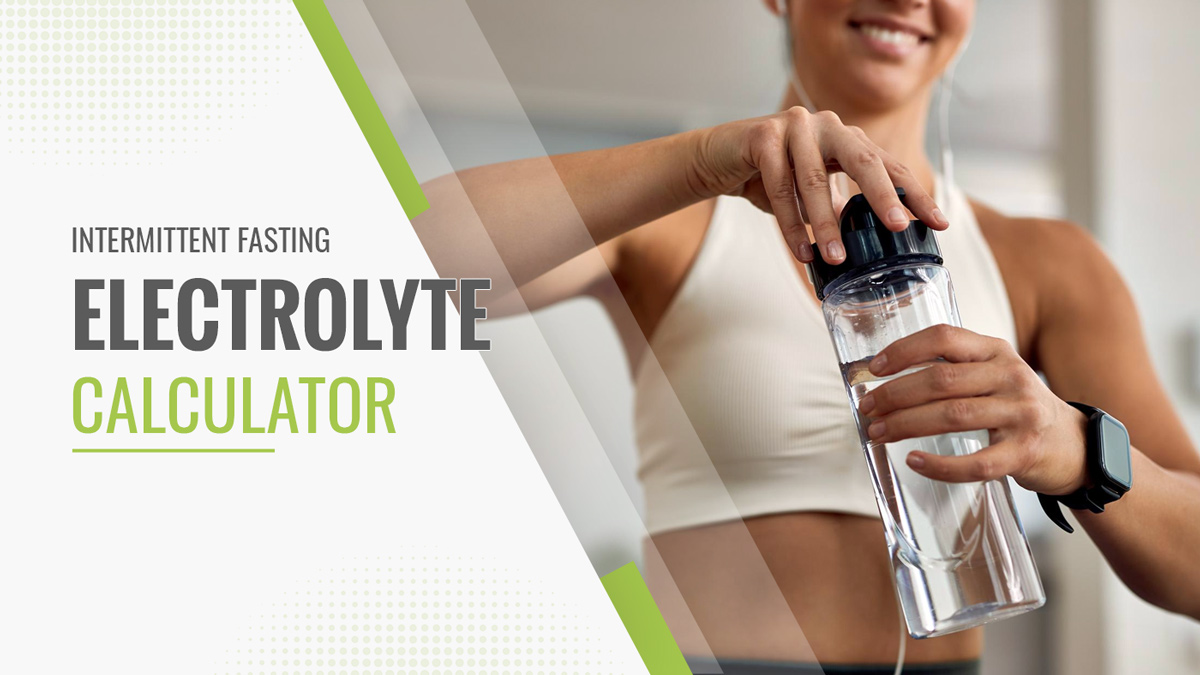Have you ever thought of combining a fasting regimen with a workout? If you have been facing this dilemma, you aren’t alone.
People often ask if fasting can help with weight loss and if integrating it with low-intensity exercises such as running improves its efficacy.
Fasting and running are incredibly effective ways to improve your health and fitness. However, many people think fasting may not be a good idea for runners.
Calculate Your Autophagy Timeline
Find out exactly when your body enters autophagy based on your unique profile, diet, and fasting protocol.
Calculate My Autophagy Window →To put it upfront, running can be easily combined with your intermittent fasting (IF) schedule. In fact, IF can improve athletic performance when done right.
As a veteran IF practitioner, I always balance my workout with fasting to maximize benefits. During my initial fasting days, I wasn’t sure whether or not I could endure the after-effects of running on an empty stomach, but it wasn’t as difficult as I thought it would be.
To help you explore the dynamics of fasting and exercising, I have tried uncovering nuances of IF and running in this article. This can help determine how fasting and running impact your fitness targets.
Explore topics such as intermittent fasting, how to combine it with running, the benefits of IF for runners, and potential drawbacks in this article.
Intermittent Fasting and Methods
Intermittent fasting is a fasting pattern in which people fast for a specific time of the day but are allowed to eat for the rest of the non-fasting hours.
There are various types of IF. Some IF methods focus on daily fasting, while others are based on weekly eating and fasting patterns.
Some IF methods for everyday fasting include:
- 16: 8 — Comprises a 16-hour fasting and an eight-hour eating time.
- 12:12 — Focuses on a 12-hour fasting and eating window.
- 14:10 — Comprises 14 hours of fasting and 10 hours of eating.
- 20:4, or the Warrior diet — Involves 20 hours of fasting and four hours of feeding time.
- 19:5 — Fasting for 19 hours and eating in a five-hour window.
- 18:6 — Fasting for 18 hours and eating in a six-hour window.
Other IF methods that are relatively prolonged are as follows:
Although none of the IF patterns prescribes any strict diet for the feeding periods, research indicates that calorie restriction in IF can be increasingly effective in achieving your fitness goals. Eating healthy food and avoiding junk, refined, or processed food items can limit extra calorie intake and can have a positive impact on weight loss targets and cardiac health. (1)
Intermittent fasting provides a range of health benefits. Aside from weight loss, IF can effectively reduce oxidative stress and inflammation. IF can enhance lipid profile and improve insulin resistance, promote autophagy, and slow down premature aging and neurodegenerative disorders, among many others. (2)
Some studies suggest that IF can effectively promote weight loss without decreasing performance in certain sports. (3) Similarly, some studies revealed that time-restricted feeding can improve athletic performance. (4) As running can be grouped as an athletic sport, let’s determine whether runners can practice IF.
Before exploring the correlation between IF and running, let’s dive into running and where it fits among different exercises.
How Can Running Help You Lose Weight?
Running is a popular aerobic exercise that can be linked to several health benefits. Besides helping you burn calories, running can help curb cravings, uplift your mood, and provide many other health benefits.
There are different types of runs, and some of the popular types include base runs, long runs, interval runs, hill repeats, and progression runs. Every running style is unique and offers exclusive benefits. While you can run at a natural pace for overall fitness and endurance, other methods can be used to build endurance and improve running power and stamina.
Here are some health benefits of running:
- Running can help burn more calories than many forms of exercise as it involves working different muscles together. (5)
- High-intensity running, such as hill repeats, can continue burning calories after you finish your workout due to the after-burn effect.
- Running can reduce your calorie intake and suppress unnecessary cravings by lowering levels of hunger hormones and producing more satiety hormones such as peptides. (6)
- Moderate to high-intensity exercises such as running can be targeted for visceral fat loss.
- Running can lower blood sugar levels and reduce the risk of heart disease, among other benefits. (7)
- Running can prevent chronic diseases and improve longevity. (8)
How Can Runners Use Intermittent Fasting To Their Advantage?
Intermittent fasting and running have several common health benefits. However, when it comes to combining IF and running, you can discourse around both its advantages and pitfalls. I’ll take you through both perspectives for a better understanding.
Let’s first explore if intermittent fasting could benefit runners.
Intermittent Fasting Has No Strict Timelines for Eating
One of the best things about IF is that it offers an array of fasting patterns you can choose to adapt to your lifestyle and fitness needs. So, runners can fast at a time of the day that best suits their routine.
As there is more than one way to fast in IF, you can pick a daily or weekly fasting schedule according to your preference. If you are someone who loves your weekend brunches and dining out with friends on Saturday nights, the 5/2 diet could make a good fit. This method allows you to fast during the week and indulge over the weekends.
Running, especially longer runs, demands more energy. This means you must keep your body well-nourished to avoid undue stress. Hence, if you practice a 16:8 IF where you fast through the night and skip an early breakfast, you can consider scheduling your runs after your brunch. However, allow your body some rest after eating and avoid running immediately after a meal.
While running in a fed state may not be recommended, running in a prolonged fasted state can also be harmful. It could cause injuries, lead to dehydration, or lead to dizziness in extreme cases.
You also need to ensure the time chosen for running outdoors is feasible. For instance, during summer, running under the scorching sun may not be a good idea. You can regulate your IF pattern or running timings accordingly. Running an hour before your fasting period could also be a viable option.
No Hard-Core Rules on Diet
In IF, time is the only restriction, and runners can easily intake the required calories during the feeding window to help them sustain high-intensity running. IF allows you to plan your meals better, making sticking to your regular healthy diet easier.
You can include healthy food such as proteins, essential carbs, and healthy fats during the eating window. Still, avoiding refined, sugary, or processed food is better, even if intermittent fasting does not pin you down with a prescribed diet.
I also bumped across a study that contrasted the idea of fueling your body with food before running. It indicated how people who trained consistently during a fasted state displayed increased endurance than those who ate before exercising. The same study revealed that IF can improve VO2 max and enable the regulation of fat mass. (9)
VO2 Max measures how much oxygen you breathe while working out. Inhaling more oxygen is synonymous with your body’s increased ability to use more energy, indicating better physical fitness.
High-intensity running can often make your body susceptible to inflammation and pain. Intermittent fasting can improve post-exercise recovery by reducing inflammation. It can also aid in the absorption of nutrition. (10)
Despite some of the benefits derived from research highlighted here, runners should exercise caution when considering IF. Read more about this in the following section.
Shortcomings of Intermittent Fasting for Runners
A few concerns around runners practicing IF include:
Impact on Performance and Weight Loss Goals
Not taking sufficient nutrition during the feeding period can diminish your running performance. Nutritional deficiencies will not only lead to fatigue but can weaken your metabolic health in the long run as the body will not have enough glycogen supply to preserve energy. This can make your future weight loss efforts much more challenging.
Dehydration
Water is an essential source of minerals for your body. Not drinking plenty of water can result in acute dehydration and weakness. You can prevent dehydration by adding non-caloric electrolyte supplements to your fasting periods, especially if you are planning to run in a fasted state.
Timing of Run
If you schedule intense runs during or toward the end of the fasting period, chances are you could feel dizzy or fatigued. This occurs as the glucose reserves are exhausted during fasting, due to the lack of energy intake from food.
FAQs
Can I run a marathon while fasting?
Well, while running a marathon can improve your physical and mental well-being, intensive running in a fasted state may not be a good idea.
If your body isn’t well-fed before a long run, such as a marathon, the lack of calories before a run can lower your performance, resulting in fatigue, weakness, and high levels of energy loss. It’s advised to consume enough food to replenish your energy reserves in the liver and muscles before embarking on a marathon while fasting.
Is it safe to run during intermittent fasting?
Yes, you can consider combining your runs with your regular intermittent fasting schedule, provided you ensure a good nutritional intake, balance training with adequate rest, and get good sleep. This ensures your body remains adequately fueled to sustain your runs and facilitates quicker recovery from low- and high-intensity running demands.
As a runner aiming to lose weight, can I eat just about anything during my non-fasting period?
While IF does not restrict your diet for the feeding window, it is not advised to eat junk, refined, processed, or sugary foods, especially if you aim to lose weight. Instead, you can eat proteins, healthy carbohydrates, and good fats in your eating window. This will fuel your body with the nutrition and calories required to support your running performance and weight loss goals.
Concluding Thoughts
Compared to a restrictive eating pattern, runners aiming to lose weight may find intermittent fasting viable in shedding extra pounds. However, this could also affect your metabolism in the long run if you are not mindful about what you feed yourself within the eating period.
For beginners doing IF, I suggest you run at an easy pace. Also, limit your runs during the fasting state. You can always push for more once you feel comfortable running long distances while fasting.
Picking the right time for your runs and refueling well with proteins can prevent muscle loss due to higher satiety and increased energy levels.
If you are confused, listen to your body and take it slow. Avoid challenging yourself for long runs during fasting. Fueling yourself with essential nutrients during the feeding periods can help you perform better and maintain lean body mass.
References
Fitness Volt is committed to providing our readers with science-based information. We use only credible and peer-reviewed sources to support the information we share in our articles.
- Klempel, M. C., Kroeger, C. M., Bhutani, S., Trepanowski, J. F., & Varady, K. A. (2012, November 21). Intermittent fasting combined with calorie restriction is effective for weight loss and cardio-protection in obese women. Nutrition Journal.
- Song, D.-K. and Kim, Y.-W. (2023) Beneficial effects of intermittent fasting: A narrative review, Journal of Yeungnam medical science.
- Da Silva, R. N. D., Szmuchrowski, L. A., Rosa, J. P. P., Santos, M. A. P. D., De Mello, M. T., Savoi, L. A., Porto, Y. F., De Assis Dias Martins Júnior, F., & Drummond, M. D. M. (2023, July 13).
- Pérez-Montilla, J. J., Cuevas-Cervera, M., Gonzalez-Muñoz, A., Del Carmen García Ríos, M., & Navarro-Ledesma, S. (2022, April 1). Efficacy of Nutritional Strategies on the Improvement of the Performance and Health of the Athlete: A Systematic Review. International Journal of Environmental Research and Public Health.
- Hamner, S.R., Seth, A. and Delp, S.L. (2010) ‘Muscle contributions to propulsion and support during running’, Journal of Biomechanics, 43(14), pp. 2709–2716.
- Broom, D., Batterham, R. L., King, J. A., & Stensel, D. J. (2009, January 1). Influence of resistance and aerobic exercise on hunger, circulating levels of acylated ghrelin, and peptide YY in healthy males. American Journal of Physiology-regulatory Integrative and Comparative Physiology.
- Hespanhol Junior, L.C. et al. (2015) ‘Meta-Analyses of the Effects of Habitual Running on Indices of Health in Physically Inactive Adults’, Sports Medicine, 45(10), pp. 1455–1468.
- Lee, D. C., Brellenthin, A. G., Thompson, P. D., Sui, X., Lee, I. M., & Lavie, C. J. (2017, July 1). Running as a Key Lifestyle Medicine for Longevity. Progress in Cardiovascular Diseases.
- Van Proeyen, K. et al. (2011) ‘Beneficial metabolic adaptations due to endurance exercise training in the fasted state’, Journal of applied physiology (Bethesda, Md. : 1985), 110(1), pp. 236–45.
- Ferguson, L. M., Rossi, K. A., Ward, E., Jadwin, E., Miller, T. A., & Miller, W. C. (2009, March 1). Effects of Caloric Restriction and Overnight Fasting on Cycling Endurance Performance. The Journal of Strength and Conditioning Research.
Tip: If you're signed in to Google, tap Follow.













